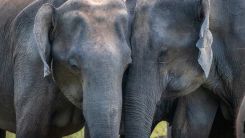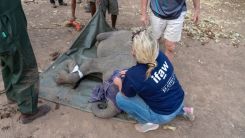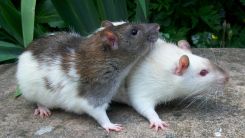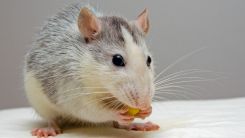Marie Morales
‘Blood Washing’: How Effective Is This Treatment Against Long-COVID?
NASA May Scrap Expensive Psyche Mission Offering Glimpse of the Past, Beginnings of Technological Future
NASA Imaging Spectrometer for Dust Mapping Across the Surface of Earth Arrives in ISS

'Zombie Gene' Explains Why Its Almost Impossible for Elephants to Have Cancer
Phase Engineering That Potentially Enables Sustainable Energy, Conversion Processes Revealed

Novavax COVID-19 Vaccine Now FDA Approved for People 18 and Above, Protein-Based Jab Has Less Side Effects

Baby Elephant Successfully Saved from Steep Manhole in Thailand; Calf’s Mother Sedated to Allow Rescue Operation

Rats’ Ability to Learn Space by Simple Observation Investigated in New Research to Better Understand Internal GPS of Humans
Mysterious Fireballs Spotted Across US Skies: Are These Just Russian Rockets Mistaken As Meteors?
Johns Hopkins Gets Permit to Continue Experimenting on Barn Owls, After Lengthy Battle With PETA Over Animal Cruelty
Xenotransplantation: NYU Researchers Succeed in Animal-to-Human Transplant Using Genetically Modified Pig Hearts
Imaging Technique Accelerated to Capture Structures of Tiny Molecules, Enhancement of Daily Life Applications from Plastics to Pharmaceuticals
Researchers Synthesize Barium Cobalt Oxide Thermoelectric Converter, Potential Source of Energy Conservation
Most Detailed Map Developed for Better Insight Into How Immune Cells Linked to Diseases Function
Nanoparticles Can Save Historical Structures from Potentially Crumbling Through the Years

Sleep Study Reveals Wolves Can be Handled, Comforted Like Dogs
Lab-Grown Human Heart: Bioartificial Left Ventricle Devised to Better Understand Cardiovascular Diseases, Potential Treatments

Multi-Fingered Robot Hand Developed to Perform Multiple Human Tasks

Frequent Video Game Players More Effective With Decision-Making Than Non-Gamers

Over 1,000 Bacteria, Viruses Trapped in Melting Tibetan Glaciers That Could Threaten Surrounding Population Discovered
British Hiker Shares Experience of a Horrifying Avalanche While Hiking Through the Tian Shan Mountains; How Does This Occurrence Take Place?

High Fat, Sugar Diets Linked to Cognitive Decline and Depression, New Mouse Study Reveals

Adding Sodium While Cooking, Eating Dangerous to Health Leading to Premature Death

Queensland Confirms First Case of Hendra Virus Since 2017; What Are the Symptoms, Treatments?
Authorities, Veterinarians Investigate Cruelty of Zoo Owner After Leaving Lions Hungry, Making Them Eat Their Own Tails
Extinct No More: Scientists Discover Reappearance of Crayfish at Shelta Cave in Alabama

Monkeypox Patient Escapes May Pen Hospital Isolation; Says He Travelled from the UK to ‘Enjoy’ Vacation in Jamaica

Hangover Cure: Taking 2 Pills 12 Hours Before Drinking Can Stop One from Adverse Effect of Drinking Alcohol

Odd Aquatic Creature Dating 518 Million Years Ago Appears to be the Earliest Vertebrate Ever Discovered, Study Suggests
Most Popular

Say Goodbye to Dark Spots: The Science Behind Dark Spot Remover Creams

Persistent Coughs Are Everywhere: Here's What Experts Think Is Causing It

Ancient Hotspot Found to Have Created Great Lakes 300 Million Years Ago

Mysterious Structures Discovered Beneath the Pacific Ocean, Puzzle Scientists




